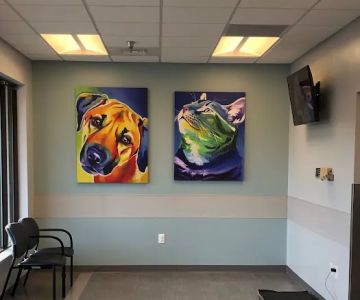Veterinary Care for Large Breed Dogs in Tampa: Essential Tips for Keeping Your Big Dog Healthy
- Why Veterinary Care for Large Breed Dogs is Crucial
- Common Health Concerns for Large Breed Dogs
- Preventative Care for Large Breed Dogs
- How to Choose the Right Veterinarian for Your Large Breed Dog in Tampa
- Real-Life Stories: Large Breed Dog Owners Share Their Experiences
- Where to Find Veterinary Care for Large Breed Dogs in Tampa
Why Veterinary Care for Large Breed Dogs is Crucial
As a pet owner of a large breed dog, you’re probably already aware of the unique challenges that come with caring for these majestic animals. Large dogs, like Great Danes, Mastiffs, and Bernese Mountain Dogs, have specific veterinary needs that differ from those of smaller breeds. Proper care, regular check-ups, and addressing breed-specific health issues are vital for maintaining the well-being of your dog. In Tampa, veterinary care for large breed dogs is essential to ensure they lead long, healthy lives, free from common health issues that may arise due to their size and structure.
Common Health Concerns for Large Breed Dogs
Large breed dogs are prone to certain health issues due to their size, which can put extra strain on their joints, bones, and organs. Understanding these health concerns can help you stay proactive in your dog's care and seek veterinary assistance when necessary.
1. Hip Dysplasia
Hip dysplasia is a common concern for large dogs, particularly for breeds like German Shepherds and Labrador Retrievers. This genetic condition involves the abnormal formation of the hip joint, leading to pain and arthritis over time. Regular vet check-ups, weight management, and appropriate exercise can help manage this condition.
2. Bloat (Gastric Torsion)
Bloat is a life-threatening condition that affects large breed dogs, particularly deep-chested breeds like Great Danes and Doberman Pinschers. It occurs when the stomach fills with gas and twists, cutting off blood flow. Emergency treatment is required, and some preventative measures, such as feeding smaller meals and avoiding vigorous exercise after eating, can reduce the risk.
3. Arthritis and Joint Problems
As large dogs age, they are more likely to develop arthritis or other joint-related issues. These can lead to stiffness, discomfort, and difficulty moving. Early detection and management, including pain relief, joint supplements, and gentle exercise, can greatly improve your dog's quality of life.
Preventative Care for Large Breed Dogs
Preventative care is essential for large breed dogs, as it can help detect health problems before they become serious. Here are some key aspects of preventative care:
1. Regular Veterinary Check-ups
Routine check-ups with a veterinarian are crucial for monitoring your large dog’s health. These visits help identify potential issues such as hip dysplasia, heart disease, or joint problems before they worsen. It’s recommended to schedule annual check-ups, or more frequently if your dog is older or has known health issues.
2. Proper Diet and Weight Management
Maintaining a healthy weight is especially important for large dogs, as excess weight puts additional strain on their joints and organs. Your veterinarian can recommend a balanced diet tailored to your dog’s age, size, and activity level.
3. Exercise and Mobility
Regular exercise helps maintain muscle tone and joint flexibility. However, it’s important to avoid overexerting your dog, as too much strain can lead to injuries. Your vet can advise you on the right type and amount of exercise for your dog, depending on their breed and physical condition.
How to Choose the Right Veterinarian for Your Large Breed Dog in Tampa
Choosing the right veterinarian is key to ensuring your large breed dog receives the best possible care. Here are some tips to help you find the right vet in Tampa:
1. Experience with Large Breeds
Look for a veterinarian who has experience with large breed dogs. These vets will be familiar with the specific health concerns of large dogs and can provide tailored advice and treatment.
2. Facility and Equipment
Ensure that the veterinary clinic is equipped to handle large breed dogs, with sufficient space and equipment for proper treatment. For example, some large dogs may require specialized examination tables or diagnostic equipment.
3. Client Reviews and Recommendations
Check online reviews and ask other pet owners for recommendations. Word of mouth is often the best way to find a trustworthy and compassionate vet who understands the needs of large breed dogs.
Real-Life Stories: Large Breed Dog Owners Share Their Experiences
Many large breed dog owners have shared their experiences and challenges in seeking veterinary care. For example, Jane, a dog mom to a Saint Bernard, spoke about the importance of preventive care in managing her dog’s arthritis. Regular check-ups with her vet have allowed Jane to keep her Saint Bernard comfortable, and she swears by joint supplements and moderate exercise as key factors in his well-being.
Similarly, Chris, a proud owner of a German Shepherd, found that early detection of hip dysplasia through routine vet visits helped him manage his dog’s condition. With the right medication, physical therapy, and weight management, his dog is living a happy and active life well into his senior years.
Where to Find Veterinary Care for Large Breed Dogs in Tampa
If you’re looking for exceptional veterinary care for your large breed dog in Tampa, visit Hidden Brook Veterinary. Their team is experienced in providing high-quality care for large dogs, offering everything from routine check-ups to specialized treatments for common large breed health issues. Explore their services and schedule an appointment today to give your large dog the best care possible.











